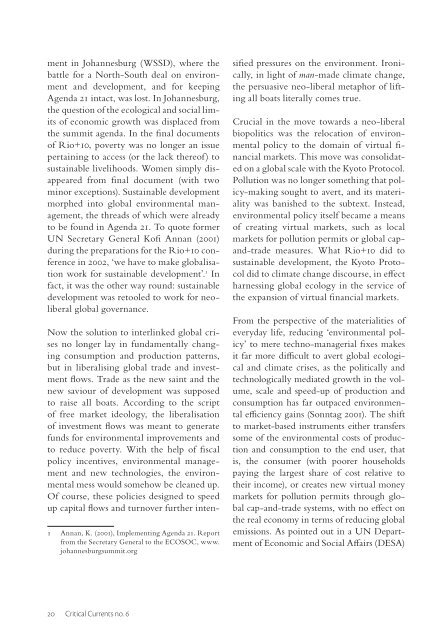Contours of Climate Justice - Dag Hammarskjöld Foundation
Contours of Climate Justice - Dag Hammarskjöld Foundation
Contours of Climate Justice - Dag Hammarskjöld Foundation
Create successful ePaper yourself
Turn your PDF publications into a flip-book with our unique Google optimized e-Paper software.
ment in Johannesburg (WSSD), where the<br />
battle for a North-South deal on environment<br />
and development, and for keeping<br />
Agenda 21 intact, was lost. In Johannesburg,<br />
the question <strong>of</strong> the ecological and social limits<br />
<strong>of</strong> economic growth was displaced from<br />
the summit agenda. In the fi nal documents<br />
<strong>of</strong> Rio+10, poverty was no longer an issue<br />
pertaining to access (or the lack there<strong>of</strong>) to<br />
sustainable livelihoods. Women simply disappeared<br />
from fi nal document (with two<br />
minor exceptions). Sustainable development<br />
morphed into global environmental management,<br />
the threads <strong>of</strong> which were already<br />
to be found in Agenda 21. To quote former<br />
UN Secretary General K<strong>of</strong>i Annan (2001)<br />
during the preparations for the Rio+10 conference<br />
in 2002, ‘we have to make globalisation<br />
work for sustainable development’. 1 In<br />
fact, it was the other way round: sustainable<br />
development was retooled to work for neoliberal<br />
global governance.<br />
Now the solution to interlinked global crises<br />
no longer lay in fundamentally changing<br />
consumption and production patterns,<br />
but in liberalising global trade and investment<br />
fl ows. Trade as the new saint and the<br />
new saviour <strong>of</strong> development was supposed<br />
to raise all boats. According to the script<br />
<strong>of</strong> free market ideology, the liberalisation<br />
<strong>of</strong> investment fl ows was meant to generate<br />
funds for environmental improvements and<br />
to reduce poverty. With the help <strong>of</strong> fi scal<br />
policy incentives, environmental management<br />
and new technologies, the environmental<br />
mess would somehow be cleaned up.<br />
Of course, these policies designed to speed<br />
up capital fl ows and turnover further inten-<br />
1 Annan, K. (2001), Implementing Agenda 21. Report<br />
from the Secretary General to the ECOSOC, www.<br />
johannesburgsummit.org<br />
20 Critical Currents no. 6<br />
sifi ed pressures on the environment. Ironically,<br />
in light <strong>of</strong> man-made climate change,<br />
the persuasive neo-liberal metaphor <strong>of</strong> lifting<br />
all boats literally comes true.<br />
Crucial in the move towards a neo-liberal<br />
bio politics was the relocation <strong>of</strong> environmental<br />
policy to the domain <strong>of</strong> virtual fi -<br />
nancial markets. This move was consolidated<br />
on a global scale with the Kyoto Protocol.<br />
Pollution was no longer something that policy-making<br />
sought to avert, and its materiality<br />
was banished to the subtext. Instead,<br />
environmental policy itself became a means<br />
<strong>of</strong> creating virtual markets, such as local<br />
markets for pollution permits or global capand-trade<br />
measures. What Rio+10 did to<br />
sustainable development, the Kyoto Protocol<br />
did to climate change discourse, in eff ect<br />
harnessing global ecology in the service <strong>of</strong><br />
the expansion <strong>of</strong> virtual fi nancial markets.<br />
From the perspective <strong>of</strong> the materialities <strong>of</strong><br />
everyday life, reducing ‘environmental policy’<br />
to mere techno-managerial fi xes makes<br />
it far more diffi cult to avert global ecological<br />
and climate crises, as the politically and<br />
technologically mediated growth in the volume,<br />
scale and speed-up <strong>of</strong> production and<br />
consumption has far outpaced environmental<br />
effi ciency gains (Sonntag 2001). The shift<br />
to market-based instruments either transfers<br />
some <strong>of</strong> the environmental costs <strong>of</strong> production<br />
and consumption to the end user, that<br />
is, the consumer (with poorer households<br />
paying the largest share <strong>of</strong> cost relative to<br />
their income), or creates new virtual money<br />
markets for pollution permits through global<br />
cap-and-trade systems, with no eff ect on<br />
the real economy in terms <strong>of</strong> reducing global<br />
emissions. As pointed out in a UN Department<br />
<strong>of</strong> Economic and Social Aff airs (DESA)
















